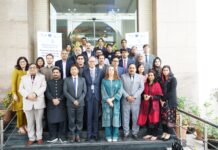Islamabad: Syed Ghazi Ghazan Jamal, Member of Provincial Assembly and Special Assistant to Chief Minister, Government of Khyber Pakhtunkhwa, has said the Khyber Pakhtunkhwa government is taking every possible measure to ease the regulations for Small and Medium Enterprises (SMEs). Besides, other steps, a provincial single window on the lines of Pakistan (National) single window is also being established. He said this while sharing his views at virtual public private dialogue ‘Better Business Regulatory Environment for SME Sector of Khyber Pakhtunkhwa’ organized by the Sustainable Development Policy Institute (SDPI), here on Thursday.
While elaborating the vision of provincial government of KP further on single window further, Mr Ghazan said that it would provide access to utilities, tax payments, business registrations, and possibly also link with federal registration and tax offices. He said that the provincial government after Covid19, has tried to ease the burden of taxes on SMEs by eliminating dual taxes. However, a higher tax target is expected to be achieved through brining untaxed sectors and individuals in the tax net. We hope that relaxed taxation and lesser regulatory burden could attract investment, he added.
Akhtiar Ahmed, while representing State Bank of Pakistan, informed the participants that SBP is encouraging commercial banks to lend to SMEs based on their cash flows and movable assets. He suggested that the Government of Khyber Pakhtunkhwa may announce long term concessional rates for utilities and land to attract investors. He said that SBP has created SME Development Forum in which private sector can submit their advice and online grievance redressal system will also be launched soon.
“We need more local research on issues of SMEs such as mineral sector in newly merged districts could be promoted,” Sohail Jan, while representing SMEDA said and added further that some infrastructure gaps need to be addressed for the success of such initiatives.
Dr Vaqar Ahmed, Joint Executive Director, SDPI, was of view that the government’s capacity to support businesses may get diminish in case Covid19 recurring in the future. He said that firms in Khyber Pakhtunkhwa are finding it hard to grow owing to lack of affordable business spaces with decent infrastructure facilities; high costs of tax compliance; difficulties in participating in international trade and low access acceptable collateral and formal finance as well as rates of internet penetration; arbitrary imposition of labour, municipal, and environmental regulations; and weak access to public procurement opportunities.
He proposed that “SMEs need to be informed regarding opportunities in CPEC and Khyber Pakhtunkhwa Annual Development Plan,” and added further that Government of Khyber Pakhtunkhwa should expedite measures under Pakistan Regulatory Modernization Initiative (PRMI) which could lead to reduction in business costs. In the wake of Covid-19 the focus should be to improve technology adoption capabilities of SMEs.
Ms Sana Zia, Development Professional, earlier highlighted around 300,000 enterprises exist in newly merged districts of Khyber Pakhtunkhwa province. However, no official data is available that and hence, it hinders informed and targeted public policy formulation. Mining, construction and commercial agriculture need to be promoted in these areas, she added.
Adnan Jalil, former Vice President, Federation of Pakistan Chamber of Commerce & Industries, on the occasion observed that the voice of SMEs is missing in policy formulation at both federal and provincial level. Besides, banks are not providing financing to new and emerging business sectors in the province.
Bilal Farooq Khan, National Incubation Center, Peshawar, emphasized that we need to bring large Pakistani firms to open production units in Khyber Pakhtunkhwa’s economic zones like Jamrud Industrial Zone. This will lead to a revival of industrialization in the province. There are very few e-commerce firms as startups require hand holding.
Dr Yasir Kamal of Institute of Management Sciences (IMS), Peshawar, while sharing academic perspective of the issue, said that we need to also encourage a focus on other sectors like agriculture and manufacturing. And hand holding to start up should be focused upon to identify the right areas for the. Mr Ahad Nazir from SDPI, earlier highlighted that the data-informed policy decisions are required from the government at federal and provincial level in order to ensure an enabling environment can be developed for businesses to develop, grow and sustain in Pakistan also enabling effective revenue mobilization.



